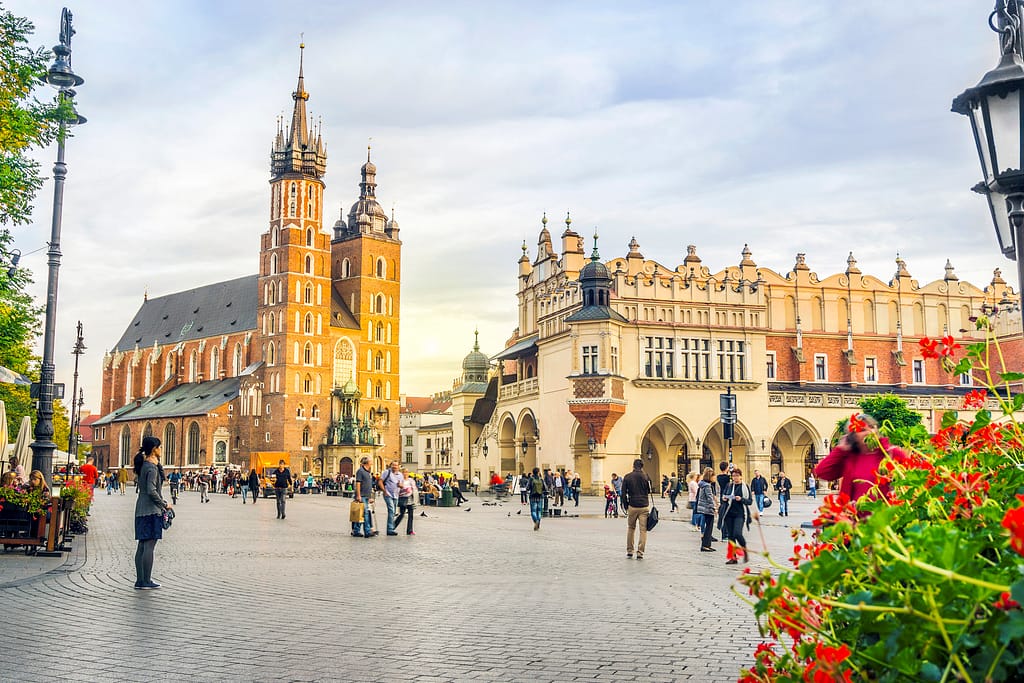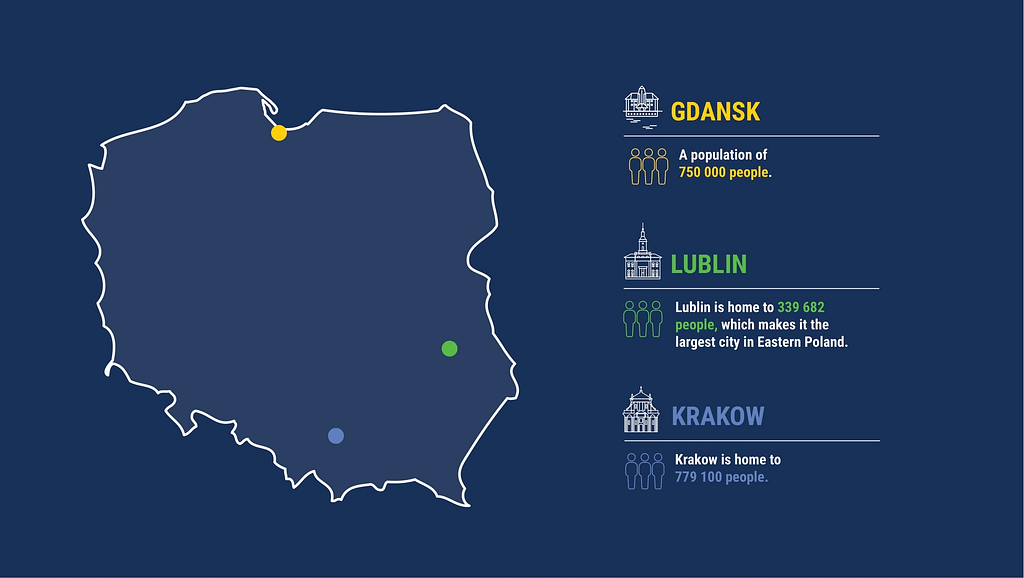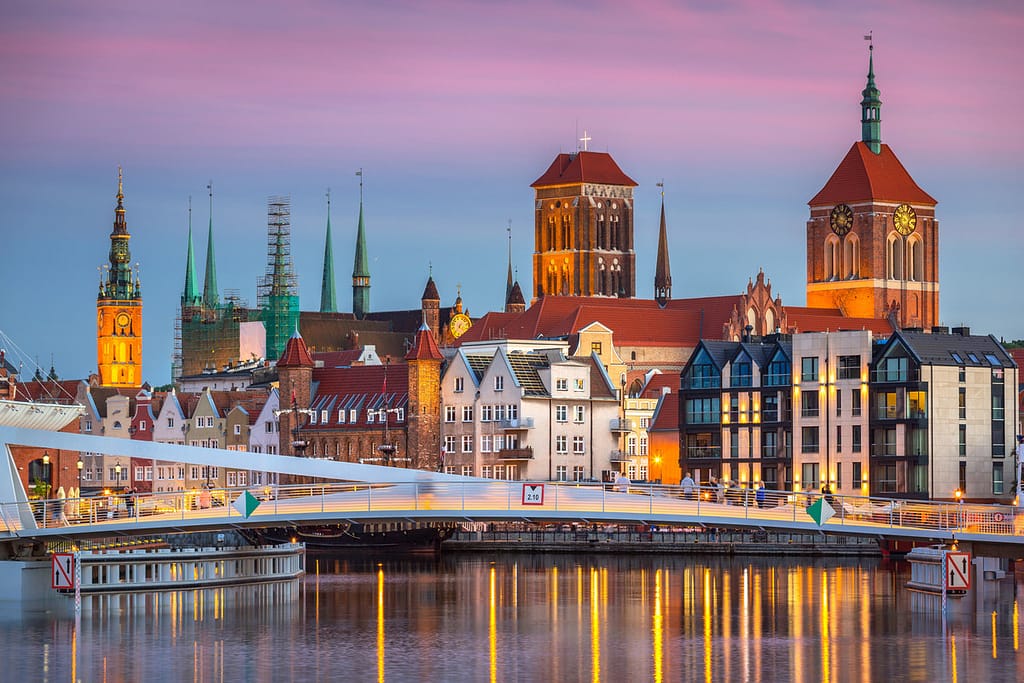Imagine cities as healthy, sustainable, and inclusive places built on resilient and happy communities; as producers rather than simply global resource drains. Many cities are already leading the way by setting ambitious sustainability goals, and a successful future rests on translating these targets into concrete solutions with measurable results. It is now time to scale up. How can we drive meaningful impact and accelerate to a sustainable future as soon as possible? How can we exchange knowledge on best practices between cities, and how can we translate citywide strategies into attainable changes that land in the built environment?
Over the last 18 months, we have teamed up with our Polish partner INNOWO to build collaborative and actionable circular economy strategies in Krakow, Lublin, and Gdańsk. Funded by the Mava Foundation, our Circular Cities Program Poland should drive long-lasting systemic transformation and ensure a sustainable future.
“For us, the circular economy is a way to make a city more economical and more friendly to its inhabitants,” said Michal Gelata of the city of Krakow, during a webinar. “It allows us to minimize the consumption and the waste which are generated in our city, as well as the consumption of natural resources, which can affect our reduction of greenhouse gas emissions. That’s why we find developing a circular economy in Krakow crucial.”

Three Polish cities at the same time
Over the last three decades, Poland’s economy has been one of the fastest growing in Europe. However, the country’s economy remains carbon-intensive. Poland accepted a national circular economy roadmap in 2018, while cities have developed additional strategies, suggesting the country is ready to transition towards a circular economy. This transition could help tackle some of Poland’s greatest social and environmental challenges. It could move the current economy into a fundamentally sustainable state by becoming resource-efficient, while creating a healthy environment for all inhabitants and limiting negative impacts elsewhere.
Krakow, Gdansk, and Lublin can play a leading role in accelerating a sustainable economy by leveraging their unique characteristics to propagate effective strategies, financial opportunities, policy changes, and infrastructure solutions. They can drive implementation, while catalyzing change and inspiring other cities to start their transition.
Before this analysis, the city of Krakow had already begun implementing circular actions over the past few years, including reusing recovered water from the wastewater treatment plant to wash streets. “We are not starting from scratch,” Gelata said. “I hope that Krakow can be, maybe not a leader, but the main city that could implement some actions. The strategy which we received from Metabolic will help us.”

This program has resulted in an action toolkit to kickstart the circular economy in Krakow, strategic input for Lublin’s 2030 strategy, and inspiration for a bottom-up innovation ecosystem in Gdansk.
Krakow: In collaboration with the municipality of Krakow, we identified a set of 24 actions to kick-start a circular economy, building upon the existing sustainability ambitions in the city and the active role of the municipality in the process. The actions require a strong network of collaboration between the private sector, academia, and civil society, all driven by strong leadership from the local government.
Lublin: Lublin’s municipal government is in the process of collecting insights from local residents to finalize the Lublin 2030 Strategy. Here, we collaboratively developed strategic directions that the municipality can take to transition towards a circular economy. As a result of the program, the municipality strengthened collaboration by initiating a program that convened different departments and local stakeholders around the topic of the circular economy.
Gdansk: Building upon extensive momentum on the ground in Gdansk, the report provides actionable examples of how bottom-up initiatives in other cities are working towards a circular economy. As a result, local stakeholders convened a cross-disciplinary driving group, The CEC Tricity Chapter, and laid the foundation for a regional circular economy network to kickstart the local transition. Specific potential lies in organizing around Gdansk’s booming construction sector.

A new methodology: Neighborhood typologies
Zooming in on the more granular neighborhood scale gives insight into the role each neighborhood can play in achieving a sustainable future based on its unique characteristics. We can design outer city neighborhoods to produce excess renewable energy serving the entire city as production centers by building on their post-industrial nature, proximity to natural resources, and existing infrastructure. By contrast, neighborhoods in the city-center might consume more due to their higher densities and older building stock. However, their inner-city location might continue to provide many of the essential cultural and commercial functions essential to any city. 18 material flow analyses on sectors from agrifood to waste, and layered these with spatial analyses and other data, have allowed us to create maps of neighborhood topologies, to provide insights into unique neighborhoods in different cities.

Continuing the journey
Implementing circular strategies in the city takes time. A successful approach includes systemic actions such as building broad awareness and cross-sectoral collaboration.
“Without broad social participation from both residents, social organisations, businesses, and academia — without all that, the city authorities have their hands tied,” said Andrzej Łazęcki of Krakow. “Only after those circles become more active can we achieve our goals.”
A key component of the program was to build active knowledge networks and driving groups both within each city and between them. Each city is unique, but recognizing these differences in and learning from each other is key to successfully transitioning to a circular economy, said Simon Clement, senior coordinator for Sustainable Economy and Procurement at ICLEI, a network of local and regional governments committed to sustainable development. “For all of us this is a very new area. There are no cities that have achieved a fully circular economy. We’re all starting on this journey. And so everything that we are each doing locally, it’s something that others can hopefully learn from.”




